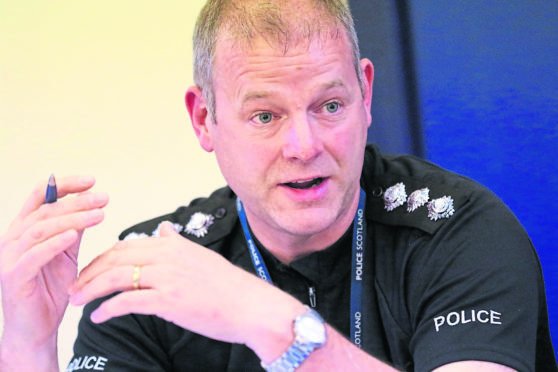Increasing numbers of missing people in the Inverness area are placing a huge drain on police resources, a local police commander told Highland councillors yesterday.
Chief Inspector Colin Gough said a missing child could have four to six officers assigned to their case, sometimes more.
And often, he added, there are two or three missing people, or more, at any one time in the Inverness area.
CI Gough said there had been a significant hike in numbers of missing people, from 587 in 2016/17 to 687 last year.
This year’s figure is already more than 300 for the first four months, with 200 of these missing looked-after children.
Mr Gough said: “It’s a small cohort of individuals who frequently go missing, often three or four times over one weekend.”
He told members of the City of Inverness Area committee that while he had every confidence in multi-partnership working with the third sector and local authority to support missing vulnerable youngsters and adults, he was concerned about the strain on policing resources.
Councillor Andrew Jarvie said when 200 looked-after children were going missing, and often in repeat incidents by the same children, it was more of a task for social services than the police.
He said: “It’s been shown that when looked-after children go missing they are most often returning to the family home. The police should be informed, but social services should deal with it initially.
“But this situation isn’t good for police or council resources.”
Mr Gough said: “I don’t think anyone would dispute our young people need to be protected in the right environment. We need to work out what the best solution is and reduce the demands placed on every organisation.”
Bill Alexander, the council’s director of Care and Learning said: “It’s always a concern when a young person is reported ‘missing’ but we work closely with the police within our missing children protocol to minimise risk and follow up the issues.”
He said looked-after children are often away from their place of residence without permission rather than missing, but do return, often very soon afterwards.
He added: “Every young person has a return interview to establish the reasons for them going missing.”
Meanwhile, councillors also heard that shoplifting was on the increase in Inverness and was pushing out to other areas.
Last year saw a rise in thefts by shoplifting from 478 to 619, well above the three year baseline average of 392.6.
Mr Gough said a small element of shoplifters were stealing to feed themselves and their family, with the majority stealing high value perfumes, alcohol and meat products to sell on to feed drug and alcohol addictions.
With police now embedded in the Town House and detailed briefings of known offenders circulating among retailers, detection rates for shoplifting were high at more than 80%, he said.
Hate crime has also increased, doubling from 31 last year to 63 this year, and sexual crime and domestic crime also look set to increase over the year, causing concern to council depute leader Alasdair Christie.
He said: “It shows we’renot making any real improvement. This is not the fault of the police, it’s more about society and attitudes, but we ought to send a message as a council domestic, sexual or hate crimes that we should shine a light on these crimes, helping our colleagues in the police.”
